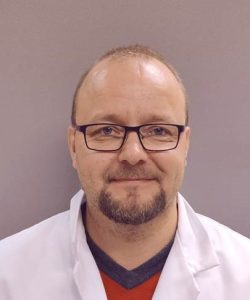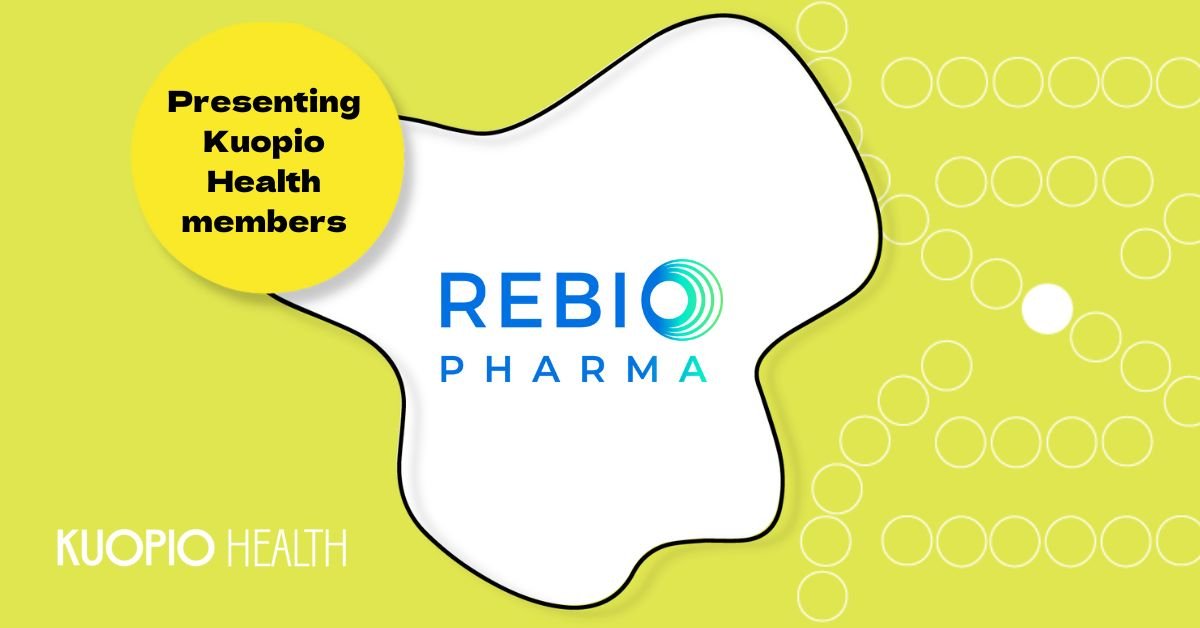ReBio Technologies is a biotechnology company established in 2015 with a focus on sustained-release delivery technology, especially in the treatment of eye diseases. The company’s main owner is ReBio Technologies Limited Hongkong, which also owns the British ReBio Technologies UK. In Finland, ReBio Technologies operates as an individual company.
The British company produces suture materials for surgical sutures. Discussions with the company’s key representatives led to an interest in venturing into pharmaceuticals and finding ways to apply the company’s expertise in polymers to drug delivery.
”ReBio launched its operations in the Turku University of Applied Sciences’ premises and, after expanding its operations, moved to Smart Chemistry Park in Raisio. Eye diseases were selected as the company’s therapeutic focus, as the company’s formulation technology is well-suited to aqueous environments, and the vitreous body of the eye is 98% water. We manufacture polymers in-house both in the UK and in Finland, and they are used as excipients in sustained-release delivery formats”, explains Harri Jukarainen, MD, the company’s CSO.

A rise in ocular diseases – new therapies needed
25% of adults develop chronic eye diseases at some point in their lives, and this number is growing by 10% annually. At the core of ReBio’s technology lies drug delivery technology that enables the release of a medical agent in the body sustained between one month to a year with a single injection. This reduces the patients’ need for daily or weekly medication, which enhances patients’ commitment to treatment, particularly in ocular diseases as older patients may struggle with the daily use of eye drops. Patient compliance also usually improves with more infrequent injections.
At the annual level, 20 million intravitreal injections are performed globally, some of which need to be carried out monthly. The current methods known as sustained release methods have failed to provide safe, effective and sustained treatment. When injected, ReBio’s SiSu® technology forms an implant as it is injected into an aqueous environment.

While the focus of ReBioPharma’s product development is currently on the treatment of ocular diseases, the company has also explored opportunities to expand its technology to other applications, such as subcutaneous delivery. This technology was the company’s original target area, but its focus shifted due to the growing needs in the eye care market and the appropriateness of polymer formulations in the field. Indeed, the company’s product development line currently consists of several products intended for the treatment of ocular diseases. The company is particularly investing in the dosage forms of Dexamethasone and Latanoprost, which provide sustained pharmacotherapy for ocular diseases such as glaucoma and post-surgical treatment.
In-house production and strong experience as competitive advantages
“While a few similar products are available in the market, they are not intended to be used in the eye but instead for subcutaneous administration, i.e. under the skin. The fact that we produce the excipient, i.e. biodegradable polymer, in-house, really sets us apart from our competitors. Having the production in our own hands also enables us to modify the polymers. After performing polymer synthesis, we use dissolution to examine how the medical agent is released at 37 °C in a water medium. This is the average temperature of the human body, which can be used to model the conditions prevailing in the body. It allows us to instantly see from the results whether or not the solution works and which changes are required in the polymer. Having the production in our own hands also means that we’re constantly improving our know-how and capabilities to better modify polymers”, Jukarainen says.
“We have long experience in polymerisation and polymers, and the fact that we do not have to pay a separate licensing fee for polymer manufacturers is, of course, one of our advantages. We have total control over this product.”
Collaboration and research
ReBioPharma has partnered with the University of Eastern Finland and the Laboratory of Pharmacology led by Professor Arto Urtti. Urtti’s research topics include drug delivery and targeting. ReBio also collaborates with the Moorfields Eye Hospital London and experts in ocular diseases.
ReBio has carried out several studies in Kuopio to verify the effectiveness of its medications before moving on to clinical trials. The company’s research and development processes include the development and testing of formulations to obtain an accurate view of the drug release profiles and performance.
ReBio is also continuing the opportunities to utilise the SiSu® platform in the treatment of chronic eye diseases in collaboration with private-sector and academic researchers. The company is currently evaluating approved systemic drug agents for repurposing in the treatment of ocular diseases.
“With the future in mind, we’re also looking for a partner that could manufacture the final product for clinical trials. We’re currently producing the patented excipients but, in the future, we will need a manufacturer that meets the GMP (Good Manufacturing Practice) criteria. This means that we’re looking for a so-called CDMO organisation (Contract Development and Manufacturing Organization) with competence in manufacturing drug products”, Jukarainen says.
Regulation and FDA approval
The company’s progress to clinical trials and market entry also requires strict compliance with regulatory processes. Pre-IND (Investigational New Drug Application) discussions with the FDA have formed an important part of this path. ReBioPharma is engaged in discussions with the authorities to ensure that it will complete any required safety studies, such as toxicological tests, in accordance with the requirements before moving on to clinical trials involving humans. The entire process is meticulously documented and the company aims to meet all the criteria required for market entry.
“We’re engaged in discussions with the FDA because they generally have the greatest experience and authority in the drug market. They have strong experience and specialists in this field, which is why the FDA is often consulted especially when it comes to more advanced products such as ours”, Jukarainen adds.
Collaboration with Kuopio Health
ReBioPharma joined the Kuopio Health ecosystem as a part of its efforts to expand its cooperation and competence in ophthalmic drug research and development. The collaboration supports the company’s growth and enables it to create valuable contacts with regional players. In fact, ReBioPharma has already received important support from both local and international organisations.
“We’ve purchased a lot of services from Kuopio, mostly from the university, and we’re also currently planning to procure services from private operators. My visits to the region have led us to build new contacts there and thanks to Arto Urtti’s networks, it was time for us to join the ecosystem. The ecosystem has a lot of companies and organisations and we want to be part of the Kuopio Health activities. We’re interested in following the results achieved in the ecosystem and being actively involved in its development. Perhaps one day, there will also be a centre of excellence in ophthalmology in the region”, Jukarainen concludes.
If you want more information or would like to explore cooperation with ReBio, contact the company at info(at)rebiopharma.com

